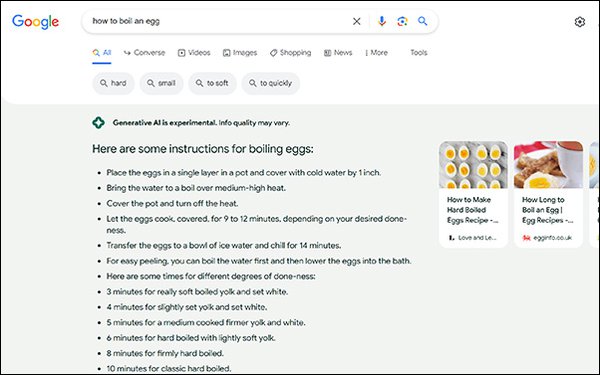Commentary
Google Search Generative Experience Becomes Major Challenge For Publishers
- by Laurie Sullivan , Staff Writer @lauriesullivan, June 12, 2023

Search engine optimization (SEO) experts and content creators months ago began pointing out challenges related to plagiarism and generative artificial intelligence (GAI).
While early concerns focused on GAI’s potential to replace jobs and spread harmful content and misinformation, publishers now are concerned with copyright infringement and plagiarism.
Then came Google's Search Generative Engine (SGE). Some believe it “grabs facts and snippets of text from a variety of sites, cobbles them together (often word-for-word) and passes off the work as its creation.”
That’s according to Avram Piltch, editor at Tom's Hardware, part of Future U.S., an international media group and digital publisher, who wrote an article about SGE and plagiarism to create attention to several issues.
advertisement
advertisement
Piltch told Inside Performance that Google has created two challenges for publishers. First, it does not correctly cite previously written content published on sites and often uses it word for word. Second, it has created a competitive publishing space by serving up much of the content in the GAI experience rather than providing links to drive traffic to the publisher site.
Some may argue that the results to the query offers related articles off to the right side of the search page to act as a citation, but Piltch does not agree that Google’s citation meets journalistic, collage or any other standard. Citation practices in SGE are in opposition to Microsoft Bing's GAI link experience, where Bing uses blue links that allow people reading the content to click through to the publisher site directly from the GAI query.
While Google wants to drive traffic to publisher sites, answers in the SGE “don’t match the top organic results” and “few people are going to click them, having gotten their ‘answer’ in the SGE text,” he wrote.
There's no denying that it's a complicated mess. Driving traffic from search to publisher sites is part of the lure and SEO strategies. There are no clear answers around questions on how Bing and Google plan to maintain and drive traffic from GAI-powered search engines.
SEO ranking factors also have become an issue. Piltch also points out that when he queried on SGE the “Best CPU” related links were from the sites Maketecheasier.com, Nanoreview and MacPaw. None come up on the first page of Google organic results for “Best CPU.”
“The MacPaw article is about how to choose the best processor for your MacBook, a topic that does not match the intent of someone searching for ‘best CPU,’ as those folks are almost certainly looking for a desktop PC processor,” Piltch wrote.
The News and Media Alliance considers training data taken without permission a copyright infringement.
Piltch told Inside Performance “that if Google follows through with SGE as it is today it would be bad for publishers, readers and the open web.”
One more point, the Verge points out that training data for Stable Diffusion, one of the biggest text-to-AI systems “contains billion of images scraped from hundreds of domains.” The article also includes a link, so people can check.



